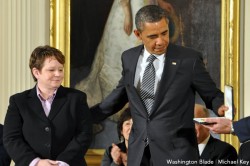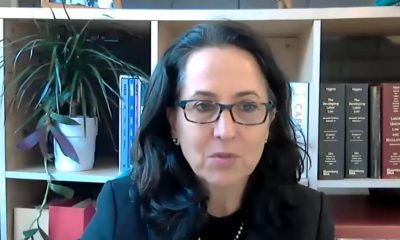National
Lesbian activist awarded Presidential Citizens Medal
Langbehn receives second-highest civilian honor

A lesbian activist who helped secure hospital visitation rights for gay couples across the country on Thursday received the nation’s second-highest civilian honor.
Janice Langbehn, who was unable to visit her partner in 2007 before she died in a Florida hospital, was among 13 recipients of the 2011 Presidential Citizens Medal. During a ceremony in the East Room of the White House, President Obama conferred the medals to each of the recipients.
During his remarks, Obama paid special attention to award recipients who took action after their families endured hardship. For Langbehn, the trial was being separated from her partner of 18 years, Lisa Pond, as she lay dying in the hospital after suffering from a brian aneurysm.
“As a father and husband, I can’t begin to imagine the grief that they must have felt in that moment — their anger and their sense that the world was not fair,” Obama said. “But they refused to let that anger define them. They each became, in Janice’s words, an ‘accidental activist.’ And thanks to their work, there are parents and partners who will never have to go through what they went through.”
Obama conferred the award to Langbehn, a lesbian who hails from Lacey, Wash., after a military aide standing the near the stage read a description of her accomplishments.
“Janice Langbehn transformed her own profound loss into a resounding call for compassion and equality,” the aide said. “Determined to spare others from similar injustice, Janice spoke out and helped ensure that same-sex couples can support and comfort each other through some of life’s toughest trials. The United States honors Janice Langbehn for advancing America’s promise of equality for all.”
Since Pond’s death, Langbehn has spoken with the press and organizations about being denied the ability to visit her partner in the hospital. Lambda Legal filed a lawsuit on her behalf against the facility, Jackson Memorial Hospital, which was unsuccessful. However, the hospital later agreed to change its policy on its own accord.
Langbehn is credited with being the figure that inspired President Obama to issue a memorandum last year directing hospitals receiving of Medicare and Medicaid funds — or virtually all hospitals — to allow patients to designate whomever they choose to visit them in the hospital, including a same-sex partner.
Her story inspired a 2009 article in the New York Times that reportedly was read by then-White House Chief of Staff Rahm Emanuel and shown to Obama. After reading the article, Obama directed Secretary of Health & Human Services Kathleen Sebelius to make the change on hospital visitation policy.
Among the 150 attendees at the ceremony were Langbehn’s brother Wallace “Skip” Langbehn; her sister Marilyn Langbehn, Human Rights Campaign Family Project Deputy Director Tom Sullivan; Beth Littrell, a staff attorney in the Southern Regional Office of Lambda Legal; and Cindi Creager, communications director of the LGBT Community Center in New York.
The Presidential Citizens Medal is given to Americans who perform “exemplary deeds of service for their country or their fellow citizens.” This year, the 13 awardees were chosen from a pool of nearly 6,000 public nominations received by the White House.
The civilian honor is second only only to the Presidential Medal of Freedom. Other honorees include civil rights activists Rosa Parks and Dorothy Height.
In a statement, Langbehn called receiving the Presidential Citizens Medal “a great honor.”
“It is my hope that my family’s loss, this medal, and the attention it brings to the discrimination our families have faced during the most difficult moments, will help ease suffering and ensure that no family has to go through what my family went through,” she said.
Joe Solmonese, president of the Human Rights Campaign, commended Langbehn in a statement for her work and said her action secure one of the most fundamental needs for gay families.
“Janice Langbehn turned her family’s healthcare horror story into action and has worked hard to make sure other LGBT Americans aren’t denied the right to be at an ailing loved one’s bedside,” Solmonese said. “Her story inspired our President to address one of our community’s most critical needs, and for that she has earned the nation’s second-highest civilian honor.”
Prior to the ceremony, Langbehn had an interview with the Washington Blade on the White House grounds. A transcript of the interview follows:
Washington Blade: Can you tell me about how you heard the news that you got this medal and what your reaction was at the time?
Janice Langbehn: It was actually found out on what would have been Lisa’s and my 20th anniversary of our holy union. And I was quite shocked because I had no idea I was even nominated for this prestigious honor. It also again reaffirms that all my speaking out over these last four-and-a-half years is important, was important and continues to be important for equality for all of us. We’re no longer second class citizens. If I can get the Presidential Citizens Medal, we all need to be first-class citizens in this country.
Blade: Now that you’re on the White House grounds, can you tell me where your thoughts are at this time?
Langbehn: I’m really nervous obviously for what’s to come. And also, I hope I’m worthy of such a high honor from the country.
Blade: Can you talk to me a little bit about what you’ve done since the death of your spouse and how it’s led to the hospital visitation rights memo?
Langbehn: It was about three months after Lisa died in ’07 that I was asked to speak at our local Pride event in Olympia, Wash. And I connected with GLAAD, who helped me figure out how to put the message together. And them, once the words came out it was so natural after that that what happened to our family was so wrong.
Lisa died completely alone. For eight hours, our children and myself were barred from her bedside for no other reason than we were gay. And so, she died completely alone, and no one should have to die alone in this country if they have family.
And I have said it since the beginning, I have felt like a failure to Lisa because our vows were in sickness and health and I wasn’t there the time she most needed me, and so speaking out was somewhat of a way to get it out the community that this happens. We need our paperwork, but this also needs to change. And that’s what President Obama, along with Secretary Sebelius was able to do, and I’m so grateful for that.
Blade: Do you think the hospital visitation rights memo that President Obama issued — did that sufficiently address the issue, or is more work needed?
Langbehn: I think it did address the issue of hospital visitation, without a doubt, and then, the follow up memo of how to implement it in hospitals that came out this last August absolutely tells hospitals, “A, B, C, D, make sure this is in your patients’ bill of rights, etc., and make sure your staff are culturally competent on LGBT issues.”
I think the one area that’s still is kind of a little grey is if the patient comes in incapacitated and the documents aren’t there ahead of time — like ours were — though it didn’t help us. So, there’s still work to do and Secretary Sebelius admits that there’s still plenty of work to do. But this is a great first step and its Lisa’s legacy.
Blade: Is there anything more you’d like to see from President Obama? What’s the next thing you’d like to see from President Obama on the issues of LGBT rights?
Langbehn: Well, he’s got to get rid of DOMA. DOMA has to go and ENDA needs to come in. I mean, I can’t say it any more bluntly than that. The more patchwork of rights that we have across the country, the more of a problem it’s going to be, so DOMA has to go, and it’s as simple as that.
Blade: Thank you so much, Ms. Langbehn. I really appreciate it.
Watch the video here:
Federal Government
Lambda Legal praises Biden-Harris administration’s finalized Title IX regulations
New rules to take effect Aug. 1

The Biden-Harris administration’s revised Title IX policy “protects LGBTQ+ students from discrimination and other abuse,” Lambda Legal said in a statement praising the U.S. Department of Education’s issuance of the final rule on Friday.
Slated to take effect on Aug. 1, the new regulations constitute an expansion of the 1972 Title IX civil rights law, which prohibits sex-based discrimination in education programs that receive federal funding.
Pursuant to the U.S. Supreme Court’s ruling in the landmark 2020 Bostock v. Clayton County case, the department’s revised policy clarifies that discrimination on the basis of sexual orientation and gender identity constitutes sex-based discrimination as defined under the law.
“These regulations make it crystal clear that everyone can access schools that are safe, welcoming and that respect their rights,” Education Secretary Miguel Cardona said during a call with reporters on Thursday.
While the new rule does not provide guidance on whether schools must allow transgender students to play on sports teams corresponding with their gender identity to comply with Title IX, the question is addressed in a separate rule proposed by the agency in April.
The administration’s new policy also reverses some Trump-era Title IX rules governing how schools must respond to reports of sexual harassment and sexual assault, which were widely seen as imbalanced in favor of the accused.
Jennifer Klein, the director of the White House Gender Policy Council, said during Thursday’s call that the department sought to strike a balance with respect to these issues, “reaffirming our longstanding commitment to fundamental fairness.”
“We applaud the Biden administration’s action to rescind the legally unsound, cruel, and dangerous sexual harassment and assault rule of the previous administration,” Lambda Legal Nonbinary and Transgender Rights Project Director Sasha Buchert said in the group’s statement on Friday.
“Today’s rule instead appropriately underscores that Title IX’s civil rights protections clearly cover LGBTQ+ students, as well as survivors and pregnant and parenting students across race and gender identity,” she said. “Schools must be places where students can learn and thrive free of harassment, discrimination, and other abuse.”
Michigan
Mich. Democrats spar over LGBTQ-inclusive hate crimes law
Lawmakers disagree on just what kind of statute to pass

Michigan could soon become the latest state to pass an LGBTQ-inclusive hate crime law, but the state’s Democratic lawmakers disagree on just what kind of law they should pass.
Currently, Michigan’s Ethnic Intimidation Act only offers limited protections to victims of crime motivated by their “race, color, religion, gender, or national origin.” Bills proposed by Democratic lawmakers expand the list to include “actual or perceived race, color, religion, gender, sexual orientation, gender identity or expression, ethnicity, physical or mental disability, age, national origin, or association or affiliation with any such individuals.”
Democratic Gov. Gretchen Whitmer and Attorney General Dana Nessel have both advocated for a hate crime law, but house and senate Democrats have each passed different hate crimes packages, and Nessel has blasted both as being too weak.
Under the house proposal that passed last year (House Bill 4474), a first offense would be punishable with a $2,000 fine, up to two years in prison, or both. Penalties double for a second offense, and if a gun or other dangerous weapons is involved, the maximum penalty is six years in prison and a fine of $7,500.
But that proposal stalled when it reached the senate, after far-right news outlets and Fox News reported misinformation that the bill only protected LGBTQ people and would make misgendering a trans person a crime. State Rep. Noah Arbit, the bill’s sponsor, was also made the subject of a recall effort, which ultimately failed.
Arbit submitted a new version of the bill (House Bill 5288) that added sections clarifying that misgendering a person, “intentionally or unintentionally” is not a hate crime, although the latest version (House Bill 5400) of the bill omits this language.
That bill has since stalled in a house committee, in part because the Democrats lost their house majority last November, when two Democratic representatives resigned after being elected mayors. The Democrats regained their house majority last night by winning two special elections.
Meanwhile, the senate passed a different package of hate crime bills sponsored by state Sen. Sylvia Santana (Senate Bill 600) in March that includes much lighter sentences, as well as a clause ensuring that misgendering a person is not a hate crime.
Under the senate bill, if the first offense is only a threat, it would be a misdemeanor punishable by one year in prison and up to $1,000 fine. A subsequent offense or first violent hate crime, including stalking, would be a felony that attracts double the punishment.
Multiple calls and emails from the Washington Blade to both Arbit and Santana requesting comment on the bills for this story went unanswered.
The attorney general’s office sent a statement to the Blade supporting stronger hate crime legislation.
“As a career prosecutor, [Nessel] has seen firsthand how the state’s weak Ethnic Intimidation Act (not updated since the late 1980’s) does not allow for meaningful law enforcement and court intervention before threats become violent and deadly, nor does it consider significant bases for bias. It is our hope that the legislature will pass robust, much-needed updates to this statute,” the statement says.
But Nessel, who has herself been the victim of racially motivated threats, has also blasted all of the bills presented by Democrats as not going far enough.
“Two years is nothing … Why not just give them a parking ticket?” Nessel told Bridge Michigan.
Nessel blames a bizarre alliance far-right and far-left forces that have doomed tougher laws.
“You have this confluence of forces on the far right … this insistence that the First Amendment protects this language, or that the Second Amendment protects the ability to possess firearms under almost any and all circumstances,” Nessel said. “But then you also have the far left that argues basically no one should go to jail or prison for any offense ever.”
The legislature did manage to pass an “institutional desecration” law last year that penalizes hate-motivated vandalism to churches, schools, museums, and community centers, and is LGBTQ-inclusive.
According to data from the U.S. Department of Justice, reported hate crime incidents have been skyrocketing, with attacks motivated by sexual orientation surging by 70 percent from 2020 to 2022, the last year for which data is available.
Twenty-two states, D.C., Puerto Rico, and the U.S. Virgin Islands have passed LGBTQ-inclusive hate crime laws. Another 11 states have hate crime laws that include protections for “sexual orientation” but not “gender identity.”
Michigan Democrats have advanced several key LGBTQ rights priorities since they took unified control of the legislature in 2023. A long-stalled comprehensive anti-discrimination law was passed last year, as did a conversion therapy ban. Last month the legislature updated family law to make surrogacy easier for all couples, including same-sex couples.
A bill to ban the “gay panic” defense has passed the state house and was due for a Senate committee hearing on Wednesday.
Indiana
Drag queen announces run for mayor of Ind. city
Branden Blaettne seeking Fort Wayne’s top office

In a Facebook post Tuesday, a local drag personality announced he was running for the office of mayor once held by the late Fort Wayne Mayor Tom Henry, who died last month just a few months into his fifth term.
Henry was recently diagnosed with late-stage stomach cancer and experienced an emergency that landed him in hospice care. He died shortly after.
WPTA, a local television station, reported that Fort Wayne resident Branden Blaettne, whose drag name is Della Licious, confirmed he filed paperwork to be one of the candidates seeking to finish out the fifth term of the late mayor.
Blaettner, who is a community organizer, told WPTA he doesn’t want to “get Fort Wayne back on track,” but rather keep the momentum started by Henry going while giving a platform to the disenfranchised groups in the community. Blaettner said he doesn’t think his local fame as a drag queen will hold him back.
“It’s easy to have a platform when you wear platform heels,” Blaettner told WPTA. “The status quo has left a lot of people out in the cold — both figuratively and literally,” Blaettner added.

The Indiana Capital Chronicle reported that state Rep. Phil GiaQuinta, who has led the Indiana House Democratic caucus since 2018, has added his name to a growing list of Fort Wayne politicos who want to be the city’s next mayor. A caucus of precinct committee persons will choose the new mayor.
According to the Fort Wayne Journal Gazette, the deadline for residents to file candidacy was 10:30 a.m. on Wednesday. A town hall with the candidates is scheduled for 6 p.m. on Thursday at Franklin School Park. The caucus is set for 10:30 a.m. on April 20 at the Lincoln Financial Event Center at Parkview Field.
At least six candidates so far have announced they will run in the caucus. They include Branden Blaettne, GiaQuinta, City Councilwoman Michelle Chambers, City Councilwoman Sharon Tucker, former city- and county-council candidate Palermo Galindo, and 2023 Democratic primary mayoral candidate Jorge Fernandez.
-

 Africa5 days ago
Africa5 days agoCongolese lawmaker introduces anti-homosexuality bill
-

 District of Columbia2 days ago
District of Columbia2 days agoReenactment of first gay rights picket at White House draws interest of tourists
-

 District of Columbia1 day ago
District of Columbia1 day agoNew D.C. LGBTQ+ bar Crush set to open April 19
-

 Arizona2 days ago
Arizona2 days agoAriz. governor vetoes anti-transgender, Ten Commandments bill













